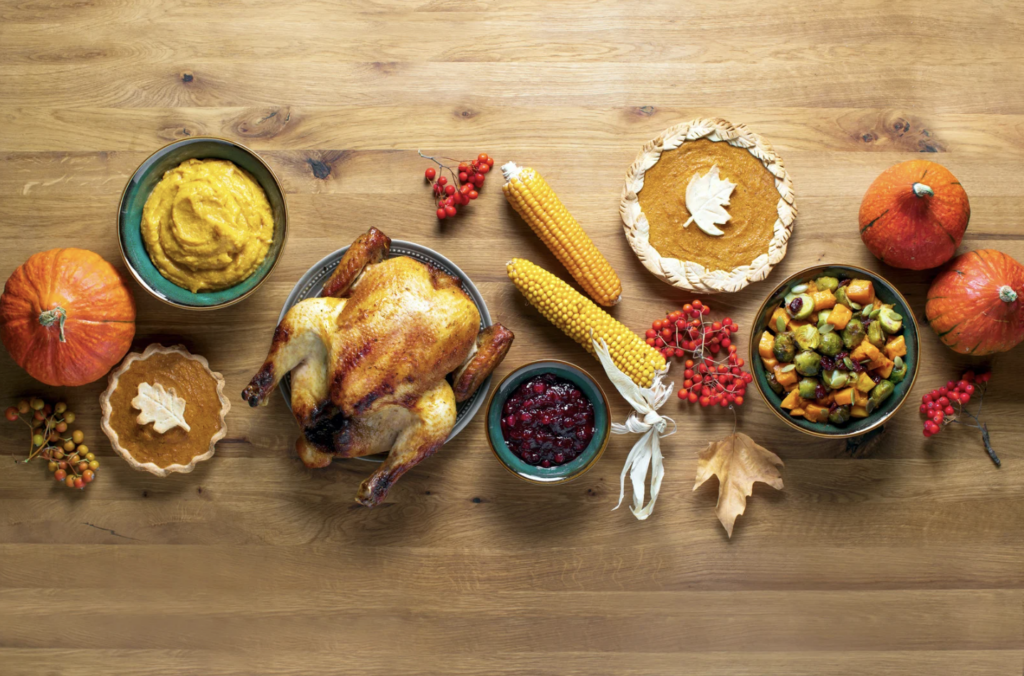Ten Tips for Healthy Holiday Eating
go.ncsu.edu/readext?1041343
en Español / em Português
El inglés es el idioma de control de esta página. En la medida en que haya algún conflicto entre la traducción al inglés y la traducción, el inglés prevalece.
Al hacer clic en el enlace de traducción se activa un servicio de traducción gratuito para convertir la página al español. Al igual que con cualquier traducción por Internet, la conversión no es sensible al contexto y puede que no traduzca el texto en su significado original. NC State Extension no garantiza la exactitud del texto traducido. Por favor, tenga en cuenta que algunas aplicaciones y/o servicios pueden no funcionar como se espera cuando se traducen.
Português
Inglês é o idioma de controle desta página. Na medida que haja algum conflito entre o texto original em Inglês e a tradução, o Inglês prevalece.
Ao clicar no link de tradução, um serviço gratuito de tradução será ativado para converter a página para o Português. Como em qualquer tradução pela internet, a conversão não é sensivel ao contexto e pode não ocorrer a tradução para o significado orginal. O serviço de Extensão da Carolina do Norte (NC State Extension) não garante a exatidão do texto traduzido. Por favor, observe que algumas funções ou serviços podem não funcionar como esperado após a tradução.
English
English is the controlling language of this page. To the extent there is any conflict between the English text and the translation, English controls.
Clicking on the translation link activates a free translation service to convert the page to Spanish. As with any Internet translation, the conversion is not context-sensitive and may not translate the text to its original meaning. NC State Extension does not guarantee the accuracy of the translated text. Please note that some applications and/or services may not function as expected when translated.
Collapse ▲Ten Tips for Healthy Holiday Eating
The holidays bring joy, celebrations, and often indulgent meals. However, with a few mindful strategies based on the Dietary Guidelines for Americans (DGA), you can enjoy festive foods without compromising your health.

1. Prioritize Nutrient-Dense Foods
Fill half your plate with vegetables and fruits, as recommended by the DGA. Choose seasonal options like roasted Brussels sprouts or sweet potatoes. These are rich in vitamins, fiber, and antioxidants, promoting satiety and reducing the urge to overeat.
2. Choose Lean Proteins
Include lean protein sources, such as turkey, fish, or plant-based proteins like lentils and beans. Protein helps maintain muscle mass and keeps you full longer, which can curb excessive snacking.
3. Moderate Added Sugars and Saturated Fats
Holiday desserts and rich dishes can be tempting. The DGA suggests limiting added sugars and saturated fats to less than 10% of your daily calorie intake. Opt for small portions of your favorite treats or healthier alternatives like baked fruit for dessert.
4. Practice Portion Control
Overeating is common during the holidays. Use smaller plates, start with smaller portions, and listen to your hunger cues. Research shows that mindful eating can prevent overeating and improve satisfaction.

5. Stay Hydrated
It’s easy to confuse thirst with hunger. Drink plenty of water throughout the day. If you’re drinking alcohol, alternate it with water to stay hydrated and reduce calorie intake.
6. Focus on Fiber
High-fiber foods, such as whole grains, vegetables, and legumes, promote digestion and help regulate bloodsugar levels. Incorporate dishes like quinoa salad, roasted chickpeas, or whole-grain stuffing.
7. Be Mindful of Beverages
Sugary drinks and cocktails can contribute to excess calorie intake. Choose options like sparkling water with a splash of cranberry juice or herbal tea.

8. Stay Active
Physical activity is crucial for maintaining energy balance during the holidays. Go for a post-meal walk or participate in fun holiday activities like ice skating or dancing.
9. Plan Ahead for Success
Planning your meals and snacks during the holidays can help you stay on track with healthy eating. If you’re attending a potluck or family gathering, bring a nutritious dish to share, such as a colorful salad or roasted vegetables. Eating a small, balanced snack with protein and fiber before arriving at events can also prevent excessive hunger and overeating. Research supports that preparation and having healthy options available can help reduce impulsive, high-calorie choices.
10. Balance Indulgence with Healthy Habits
The holidays are about enjoyment, so it’s important to strike a balance. Allow yourself to savor your favorite holiday foods in moderation rather than restricting them entirely, which can lead to overindulgence later. Pair rich dishes with lighter ones, like creamy mashed potatoes alongside a fresh green salad. Remember that the focus of holiday meals often extends beyond the food—it’s about connecting with loved ones. Shift your attention to the social aspects of the gathering, which can help reduce the temptation to overeat.
Enjoying holiday meals doesn’t mean you need to compromise your health goals. By making mindful choices and following these tips, you can savor the season while staying on track. A balance of indulgence and nutrition ensures a festive and healthy holiday!




